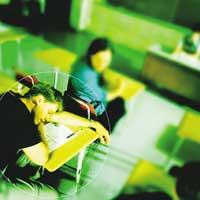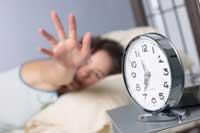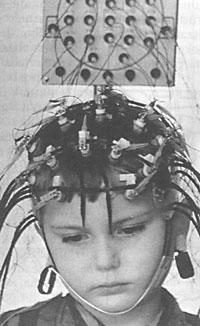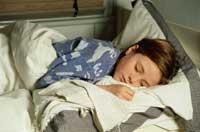Synchronize biological watches!
2004/08/01 Rementeria Argote, Nagore - Elhuyar Zientziaren Komunikazioa

Many external factors are known to influence sleep. Worries, excessive tiredness or lack of adequate sleep environment, for example, prevent quiet sleep. Therefore, if you want to sleep well, you should have good memories in your head, have dinner a few hours before bedtime and have a quiet, dark and well ventilated room.
But despite all these advice, there are people who by themselves are gaucuma. These are usually much more active at dusk than at dawn. On the contrary, in the early morning he is more awake than the rest. That is, not all biological clocks are synchronized with daylight.
According to experts, being gautxoria or early is written in genes. We know about three genes related to sleep, and one of them, called Per3, is shorter than normal, which marks the tendency to be gautxoria and, on the contrary, longer, to be early.
The human body adjusts its biological clock daily according to daylight. But this setting becomes harder for those who tend to have a cycle higher than 24 hours, i.e., strollers, and it costs them more to wake up in the morning than the rest.
Descending

A similar problem occurs when we travel to a distant country. And the schedule is different: when it is there day it is night for the body and vice versa. The biological clock of the body tries to adapt to its schedule, but it is usual that the first days are bedrooms and can not sleep at night.
There is a medicine to solve the discomfort that causes the change of schedule: melatonin. It is a natural hormone that creates the body and that by its relationship with sleep is also called sleep hormone. A correct take helps to synchronize sleep with night.
But, as we have said, the body performs this synchronization naturally, using daylight for it. Not all the molecular details of the effect of light on the lo-esna cycle are known, but apparently, and explaining it from the surface, melatonin occurs during night sleep and is believed to be related to deep sleep.
Those who dream of deep sleep are many, even dream that they are awake. For example, older people have more problems than young people to sleep all night. Alzheimer's patients, on the other hand, have altered the time of the biological clock, and often remain very active at night, while the one who has to take care subsides the sleep.

Well, to study the effect of light on sleep, nursing homes and Alzheimer's patients have been used. And the results seem quite clear: those who are in the light during the day sleep better at night. Therefore, light is directly related to sleep.
In view of these results, some workshops are also trying to play with the light so that those who do the night shift have less sleep problems. And when working at night and sleeping by day, the schedule is overturned, and many times those people sleep less hours than normal. The use of light in night shifts is being investigated and, among other things, it is being studied how workers respond with more light than usual in a Volkswagen factory, hoping that they 'deceive' the body clock and that workers are not only better asleep during the day, but remain more active at night for more work.
Teens who go to class early in the morning also have sleep problems, as most teens are kangaroos by nature and it's hard to watch what the teacher says early in the morning. In the early hours of the day the performance of the student body is lower, in short, there is a time problem. Perhaps the schedule of schools should be adjusted to the biological clock of adolescents.
It has also begun to discuss whether schedules should not be adapted to the biological clock of each person, so that the operator is as clear as possible during working hours or the student. Those who struggle hard are circadian biologists who study 24-hour cycles. These biologists have been researching the relationship of the day and night cycle to sleep for years.

According to these studies, for example, it is known that young people, especially in adolescence, are more active at dusk; and older people reverse: they are usually very early. However, each person has his own schedule, since although it is established that the cycle of daily life is 24 hours, the cycle of a person can be more or less long than 24 hours, and many of these problems come from the difficulty of adapting his cycle to the everyday.
Published in 7K.

Gai honi buruzko eduki gehiago
Elhuyarrek garatutako teknologia





